Leadership and Management in Service Industries: The Langham London
VerifiedAdded on 2023/01/11
|10
|3260
|81
Report
AI Summary
This report provides a comprehensive analysis of leadership and management principles within the context of service industries, using The Langham London hotel as a case study. It begins with an overview of classical management theories, including Fayol's, Taylor's, and Weber's bureaucratic theory, and their application within the hotel. The report then explores various leadership styles, such as autocratic, democratic, and laissez-faire, and the roles leaders play within an organization. It further examines management styles, including administrative, bureaucratic, persuasive, and directive approaches. A key focus is placed on internal and external factors influencing organizational management, such as employee skills, leadership abilities, the nature of the business, globalization, and diverse stakeholder management. The report also details essential management skills, encompassing communication, delegation, inspirational motivation, and positive attitude, along with future-oriented skills. The assignment concludes with a poster summary and overall conclusions, referencing relevant academic sources.
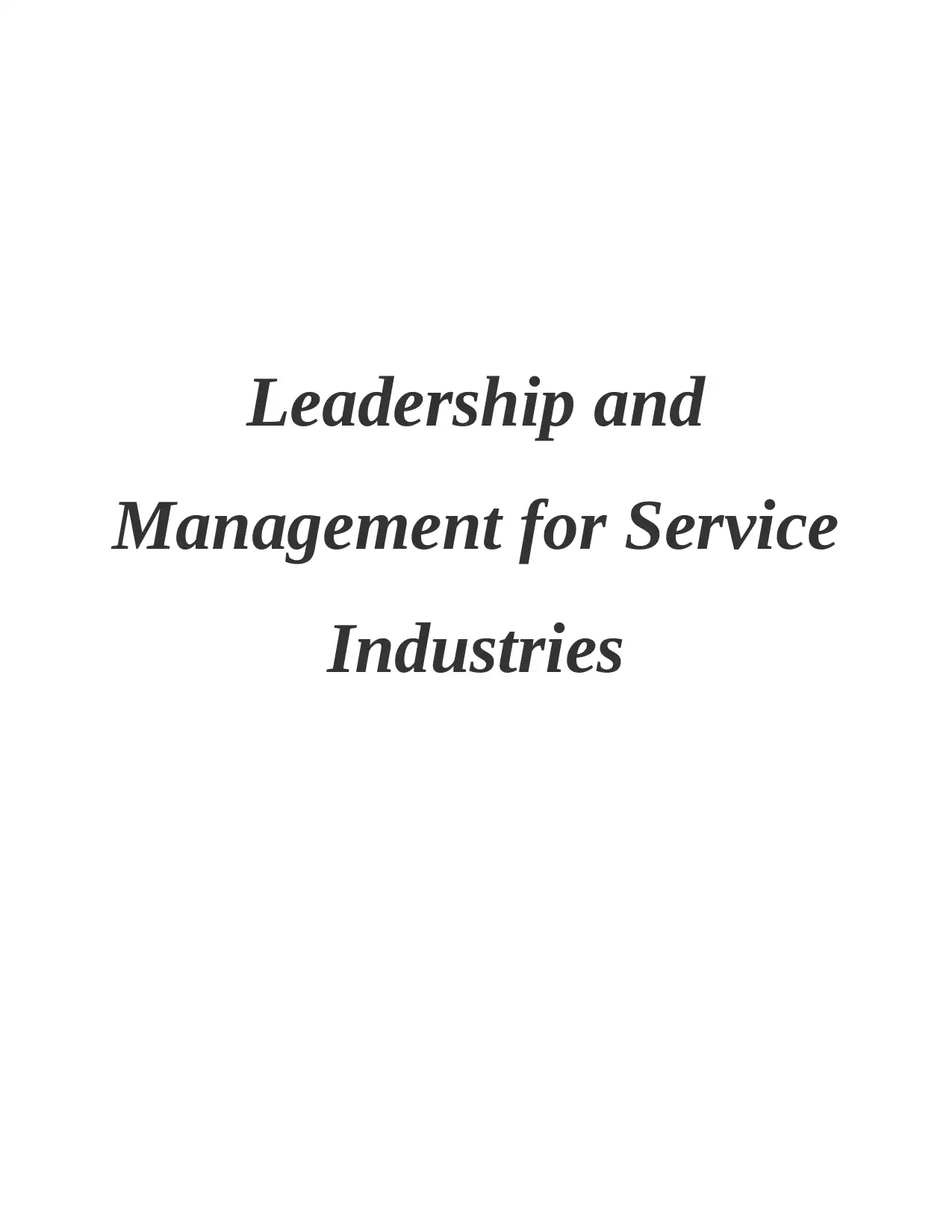
Leadership and
Management for Service
Industries
Management for Service
Industries
Paraphrase This Document
Need a fresh take? Get an instant paraphrase of this document with our AI Paraphraser
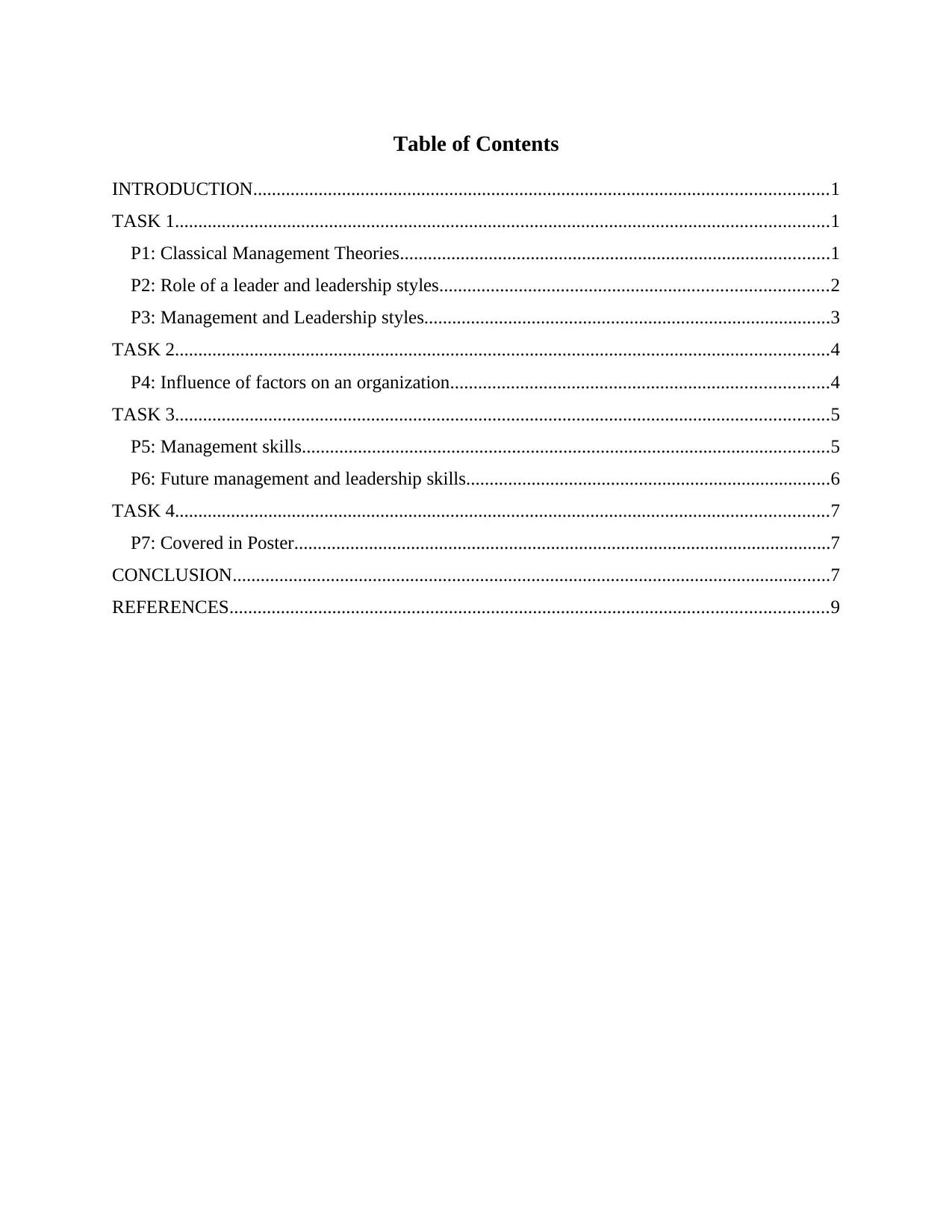
Table of Contents
INTRODUCTION...........................................................................................................................1
TASK 1............................................................................................................................................1
P1: Classical Management Theories............................................................................................1
P2: Role of a leader and leadership styles...................................................................................2
P3: Management and Leadership styles.......................................................................................3
TASK 2............................................................................................................................................4
P4: Influence of factors on an organization.................................................................................4
TASK 3............................................................................................................................................5
P5: Management skills.................................................................................................................5
P6: Future management and leadership skills..............................................................................6
TASK 4............................................................................................................................................7
P7: Covered in Poster...................................................................................................................7
CONCLUSION................................................................................................................................7
REFERENCES................................................................................................................................9
INTRODUCTION...........................................................................................................................1
TASK 1............................................................................................................................................1
P1: Classical Management Theories............................................................................................1
P2: Role of a leader and leadership styles...................................................................................2
P3: Management and Leadership styles.......................................................................................3
TASK 2............................................................................................................................................4
P4: Influence of factors on an organization.................................................................................4
TASK 3............................................................................................................................................5
P5: Management skills.................................................................................................................5
P6: Future management and leadership skills..............................................................................6
TASK 4............................................................................................................................................7
P7: Covered in Poster...................................................................................................................7
CONCLUSION................................................................................................................................7
REFERENCES................................................................................................................................9
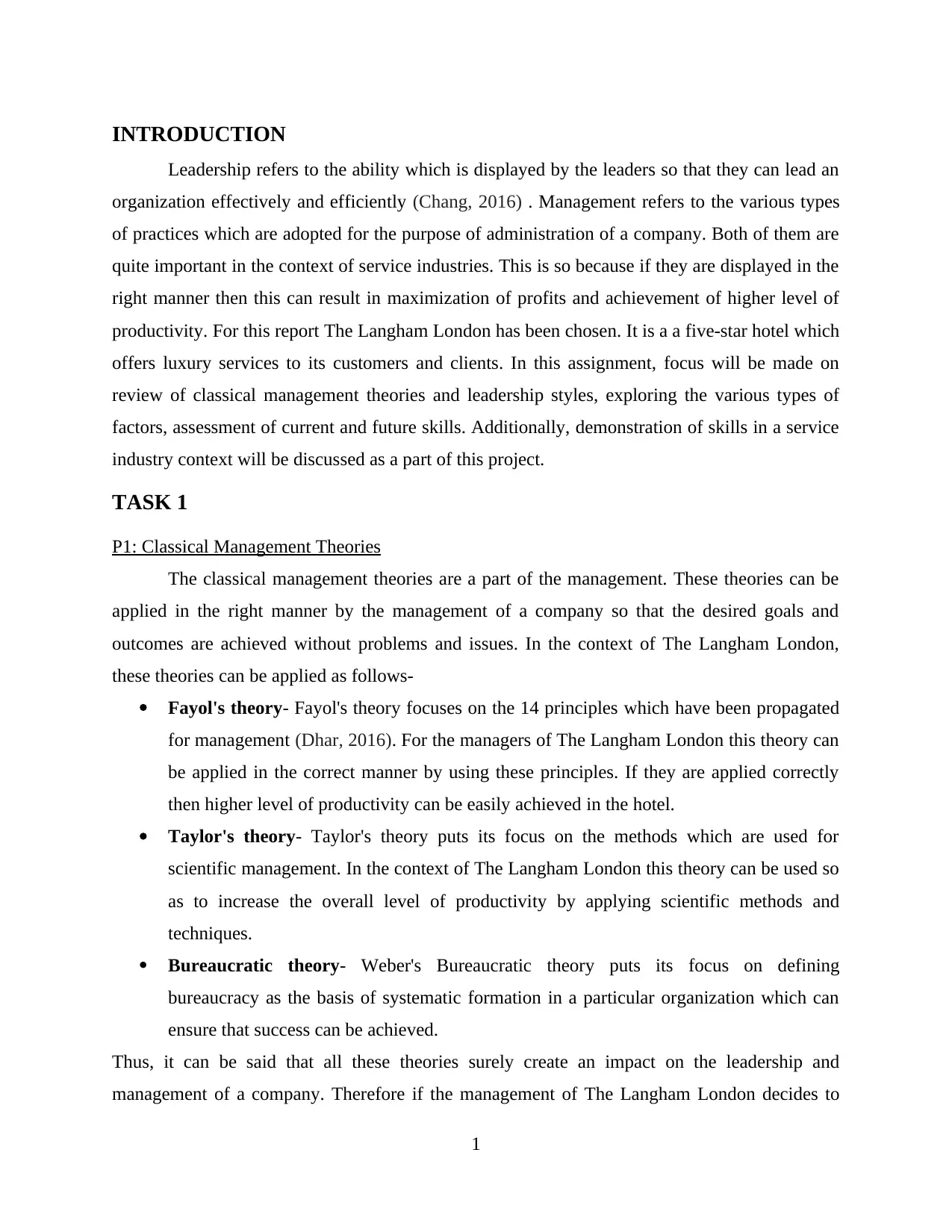
INTRODUCTION
Leadership refers to the ability which is displayed by the leaders so that they can lead an
organization effectively and efficiently (Chang, 2016) . Management refers to the various types
of practices which are adopted for the purpose of administration of a company. Both of them are
quite important in the context of service industries. This is so because if they are displayed in the
right manner then this can result in maximization of profits and achievement of higher level of
productivity. For this report The Langham London has been chosen. It is a a five-star hotel which
offers luxury services to its customers and clients. In this assignment, focus will be made on
review of classical management theories and leadership styles, exploring the various types of
factors, assessment of current and future skills. Additionally, demonstration of skills in a service
industry context will be discussed as a part of this project.
TASK 1
P1: Classical Management Theories
The classical management theories are a part of the management. These theories can be
applied in the right manner by the management of a company so that the desired goals and
outcomes are achieved without problems and issues. In the context of The Langham London,
these theories can be applied as follows-
Fayol's theory- Fayol's theory focuses on the 14 principles which have been propagated
for management (Dhar, 2016). For the managers of The Langham London this theory can
be applied in the correct manner by using these principles. If they are applied correctly
then higher level of productivity can be easily achieved in the hotel.
Taylor's theory- Taylor's theory puts its focus on the methods which are used for
scientific management. In the context of The Langham London this theory can be used so
as to increase the overall level of productivity by applying scientific methods and
techniques.
Bureaucratic theory- Weber's Bureaucratic theory puts its focus on defining
bureaucracy as the basis of systematic formation in a particular organization which can
ensure that success can be achieved.
Thus, it can be said that all these theories surely create an impact on the leadership and
management of a company. Therefore if the management of The Langham London decides to
1
Leadership refers to the ability which is displayed by the leaders so that they can lead an
organization effectively and efficiently (Chang, 2016) . Management refers to the various types
of practices which are adopted for the purpose of administration of a company. Both of them are
quite important in the context of service industries. This is so because if they are displayed in the
right manner then this can result in maximization of profits and achievement of higher level of
productivity. For this report The Langham London has been chosen. It is a a five-star hotel which
offers luxury services to its customers and clients. In this assignment, focus will be made on
review of classical management theories and leadership styles, exploring the various types of
factors, assessment of current and future skills. Additionally, demonstration of skills in a service
industry context will be discussed as a part of this project.
TASK 1
P1: Classical Management Theories
The classical management theories are a part of the management. These theories can be
applied in the right manner by the management of a company so that the desired goals and
outcomes are achieved without problems and issues. In the context of The Langham London,
these theories can be applied as follows-
Fayol's theory- Fayol's theory focuses on the 14 principles which have been propagated
for management (Dhar, 2016). For the managers of The Langham London this theory can
be applied in the correct manner by using these principles. If they are applied correctly
then higher level of productivity can be easily achieved in the hotel.
Taylor's theory- Taylor's theory puts its focus on the methods which are used for
scientific management. In the context of The Langham London this theory can be used so
as to increase the overall level of productivity by applying scientific methods and
techniques.
Bureaucratic theory- Weber's Bureaucratic theory puts its focus on defining
bureaucracy as the basis of systematic formation in a particular organization which can
ensure that success can be achieved.
Thus, it can be said that all these theories surely create an impact on the leadership and
management of a company. Therefore if the management of The Langham London decides to
1
⊘ This is a preview!⊘
Do you want full access?
Subscribe today to unlock all pages.

Trusted by 1+ million students worldwide
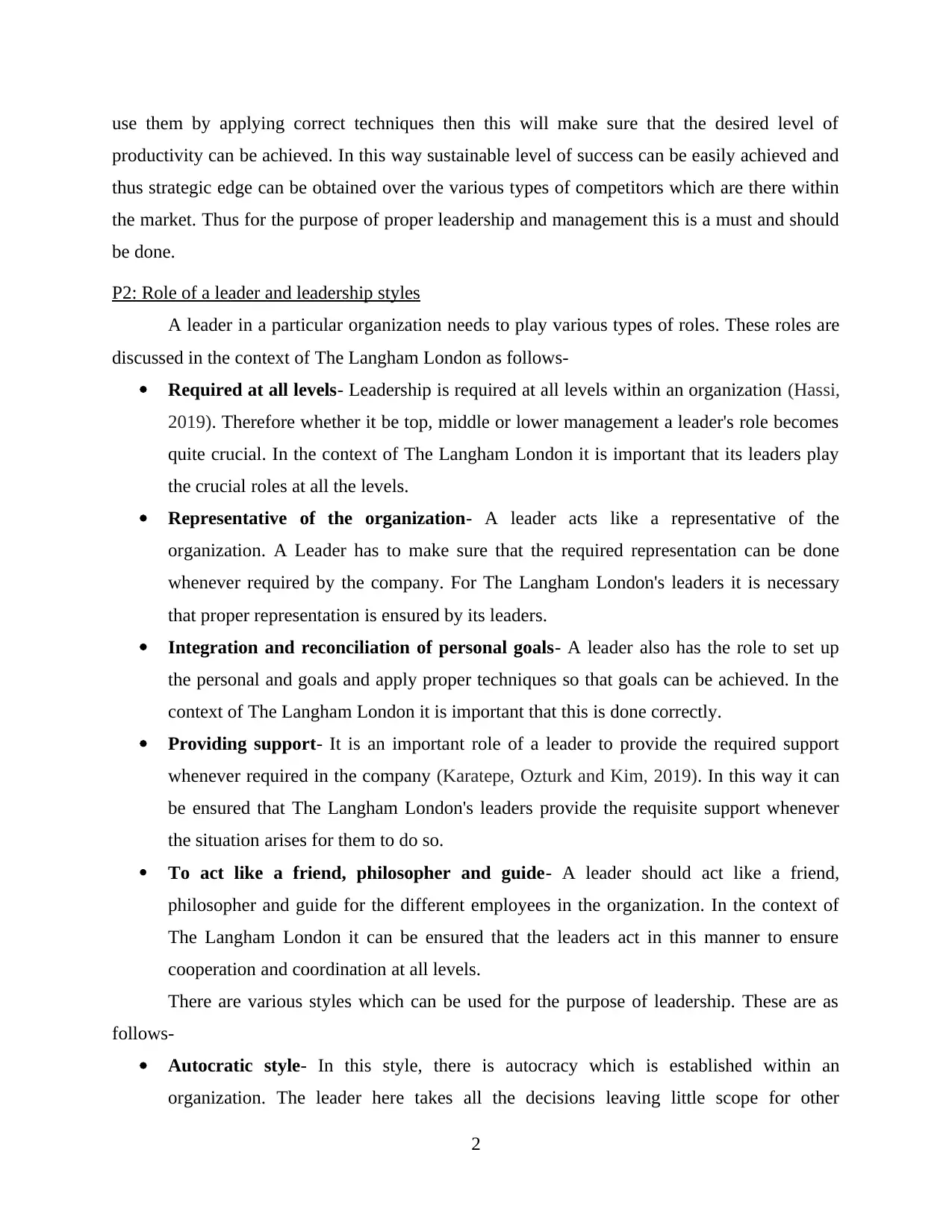
use them by applying correct techniques then this will make sure that the desired level of
productivity can be achieved. In this way sustainable level of success can be easily achieved and
thus strategic edge can be obtained over the various types of competitors which are there within
the market. Thus for the purpose of proper leadership and management this is a must and should
be done.
P2: Role of a leader and leadership styles
A leader in a particular organization needs to play various types of roles. These roles are
discussed in the context of The Langham London as follows-
Required at all levels- Leadership is required at all levels within an organization (Hassi,
2019). Therefore whether it be top, middle or lower management a leader's role becomes
quite crucial. In the context of The Langham London it is important that its leaders play
the crucial roles at all the levels.
Representative of the organization- A leader acts like a representative of the
organization. A Leader has to make sure that the required representation can be done
whenever required by the company. For The Langham London's leaders it is necessary
that proper representation is ensured by its leaders.
Integration and reconciliation of personal goals- A leader also has the role to set up
the personal and goals and apply proper techniques so that goals can be achieved. In the
context of The Langham London it is important that this is done correctly.
Providing support- It is an important role of a leader to provide the required support
whenever required in the company (Karatepe, Ozturk and Kim, 2019). In this way it can
be ensured that The Langham London's leaders provide the requisite support whenever
the situation arises for them to do so.
To act like a friend, philosopher and guide- A leader should act like a friend,
philosopher and guide for the different employees in the organization. In the context of
The Langham London it can be ensured that the leaders act in this manner to ensure
cooperation and coordination at all levels.
There are various styles which can be used for the purpose of leadership. These are as
follows-
Autocratic style- In this style, there is autocracy which is established within an
organization. The leader here takes all the decisions leaving little scope for other
2
productivity can be achieved. In this way sustainable level of success can be easily achieved and
thus strategic edge can be obtained over the various types of competitors which are there within
the market. Thus for the purpose of proper leadership and management this is a must and should
be done.
P2: Role of a leader and leadership styles
A leader in a particular organization needs to play various types of roles. These roles are
discussed in the context of The Langham London as follows-
Required at all levels- Leadership is required at all levels within an organization (Hassi,
2019). Therefore whether it be top, middle or lower management a leader's role becomes
quite crucial. In the context of The Langham London it is important that its leaders play
the crucial roles at all the levels.
Representative of the organization- A leader acts like a representative of the
organization. A Leader has to make sure that the required representation can be done
whenever required by the company. For The Langham London's leaders it is necessary
that proper representation is ensured by its leaders.
Integration and reconciliation of personal goals- A leader also has the role to set up
the personal and goals and apply proper techniques so that goals can be achieved. In the
context of The Langham London it is important that this is done correctly.
Providing support- It is an important role of a leader to provide the required support
whenever required in the company (Karatepe, Ozturk and Kim, 2019). In this way it can
be ensured that The Langham London's leaders provide the requisite support whenever
the situation arises for them to do so.
To act like a friend, philosopher and guide- A leader should act like a friend,
philosopher and guide for the different employees in the organization. In the context of
The Langham London it can be ensured that the leaders act in this manner to ensure
cooperation and coordination at all levels.
There are various styles which can be used for the purpose of leadership. These are as
follows-
Autocratic style- In this style, there is autocracy which is established within an
organization. The leader here takes all the decisions leaving little scope for other
2
Paraphrase This Document
Need a fresh take? Get an instant paraphrase of this document with our AI Paraphraser
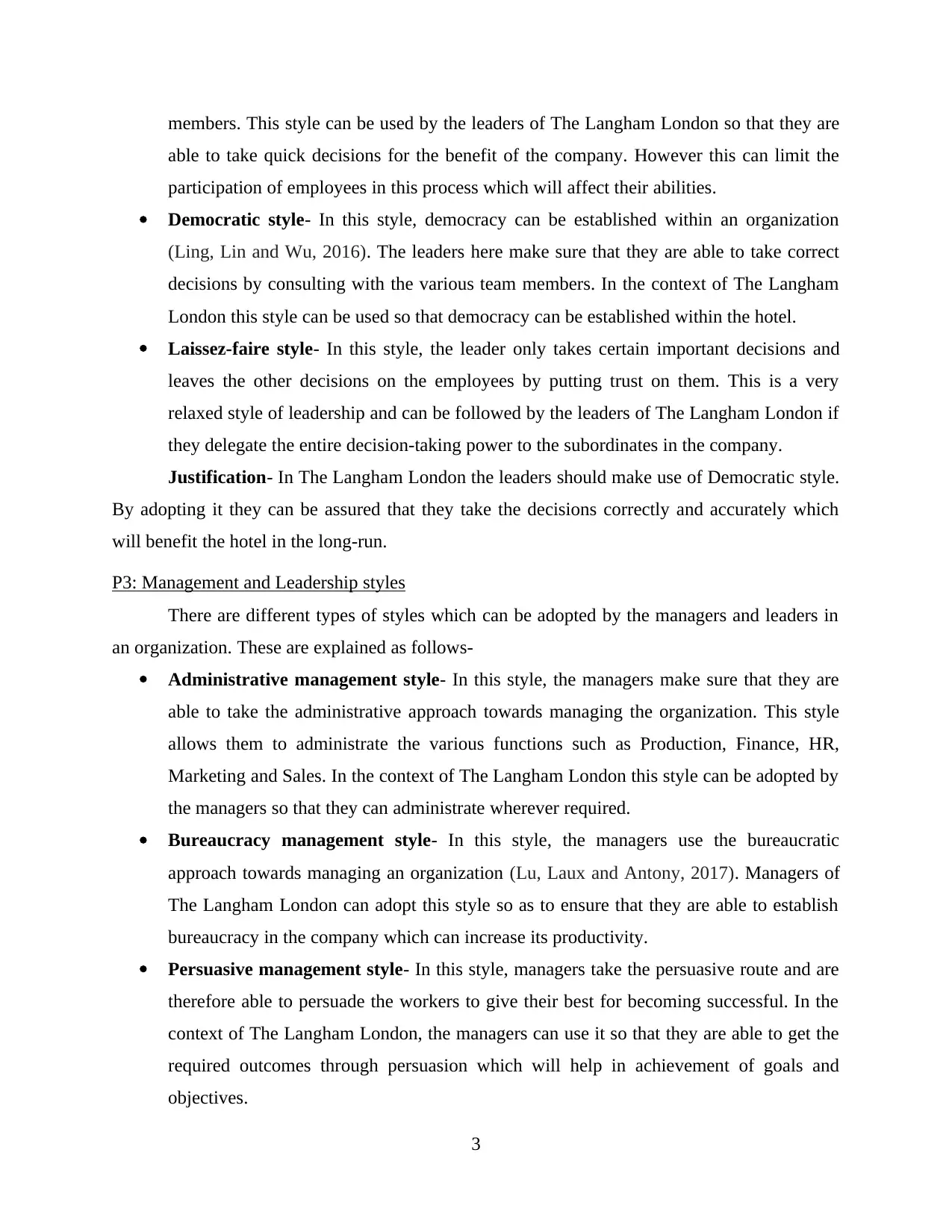
members. This style can be used by the leaders of The Langham London so that they are
able to take quick decisions for the benefit of the company. However this can limit the
participation of employees in this process which will affect their abilities.
Democratic style- In this style, democracy can be established within an organization
(Ling, Lin and Wu, 2016). The leaders here make sure that they are able to take correct
decisions by consulting with the various team members. In the context of The Langham
London this style can be used so that democracy can be established within the hotel.
Laissez-faire style- In this style, the leader only takes certain important decisions and
leaves the other decisions on the employees by putting trust on them. This is a very
relaxed style of leadership and can be followed by the leaders of The Langham London if
they delegate the entire decision-taking power to the subordinates in the company.
Justification- In The Langham London the leaders should make use of Democratic style.
By adopting it they can be assured that they take the decisions correctly and accurately which
will benefit the hotel in the long-run.
P3: Management and Leadership styles
There are different types of styles which can be adopted by the managers and leaders in
an organization. These are explained as follows-
Administrative management style- In this style, the managers make sure that they are
able to take the administrative approach towards managing the organization. This style
allows them to administrate the various functions such as Production, Finance, HR,
Marketing and Sales. In the context of The Langham London this style can be adopted by
the managers so that they can administrate wherever required.
Bureaucracy management style- In this style, the managers use the bureaucratic
approach towards managing an organization (Lu, Laux and Antony, 2017). Managers of
The Langham London can adopt this style so as to ensure that they are able to establish
bureaucracy in the company which can increase its productivity.
Persuasive management style- In this style, managers take the persuasive route and are
therefore able to persuade the workers to give their best for becoming successful. In the
context of The Langham London, the managers can use it so that they are able to get the
required outcomes through persuasion which will help in achievement of goals and
objectives.
3
able to take quick decisions for the benefit of the company. However this can limit the
participation of employees in this process which will affect their abilities.
Democratic style- In this style, democracy can be established within an organization
(Ling, Lin and Wu, 2016). The leaders here make sure that they are able to take correct
decisions by consulting with the various team members. In the context of The Langham
London this style can be used so that democracy can be established within the hotel.
Laissez-faire style- In this style, the leader only takes certain important decisions and
leaves the other decisions on the employees by putting trust on them. This is a very
relaxed style of leadership and can be followed by the leaders of The Langham London if
they delegate the entire decision-taking power to the subordinates in the company.
Justification- In The Langham London the leaders should make use of Democratic style.
By adopting it they can be assured that they take the decisions correctly and accurately which
will benefit the hotel in the long-run.
P3: Management and Leadership styles
There are different types of styles which can be adopted by the managers and leaders in
an organization. These are explained as follows-
Administrative management style- In this style, the managers make sure that they are
able to take the administrative approach towards managing the organization. This style
allows them to administrate the various functions such as Production, Finance, HR,
Marketing and Sales. In the context of The Langham London this style can be adopted by
the managers so that they can administrate wherever required.
Bureaucracy management style- In this style, the managers use the bureaucratic
approach towards managing an organization (Lu, Laux and Antony, 2017). Managers of
The Langham London can adopt this style so as to ensure that they are able to establish
bureaucracy in the company which can increase its productivity.
Persuasive management style- In this style, managers take the persuasive route and are
therefore able to persuade the workers to give their best for becoming successful. In the
context of The Langham London, the managers can use it so that they are able to get the
required outcomes through persuasion which will help in achievement of goals and
objectives.
3
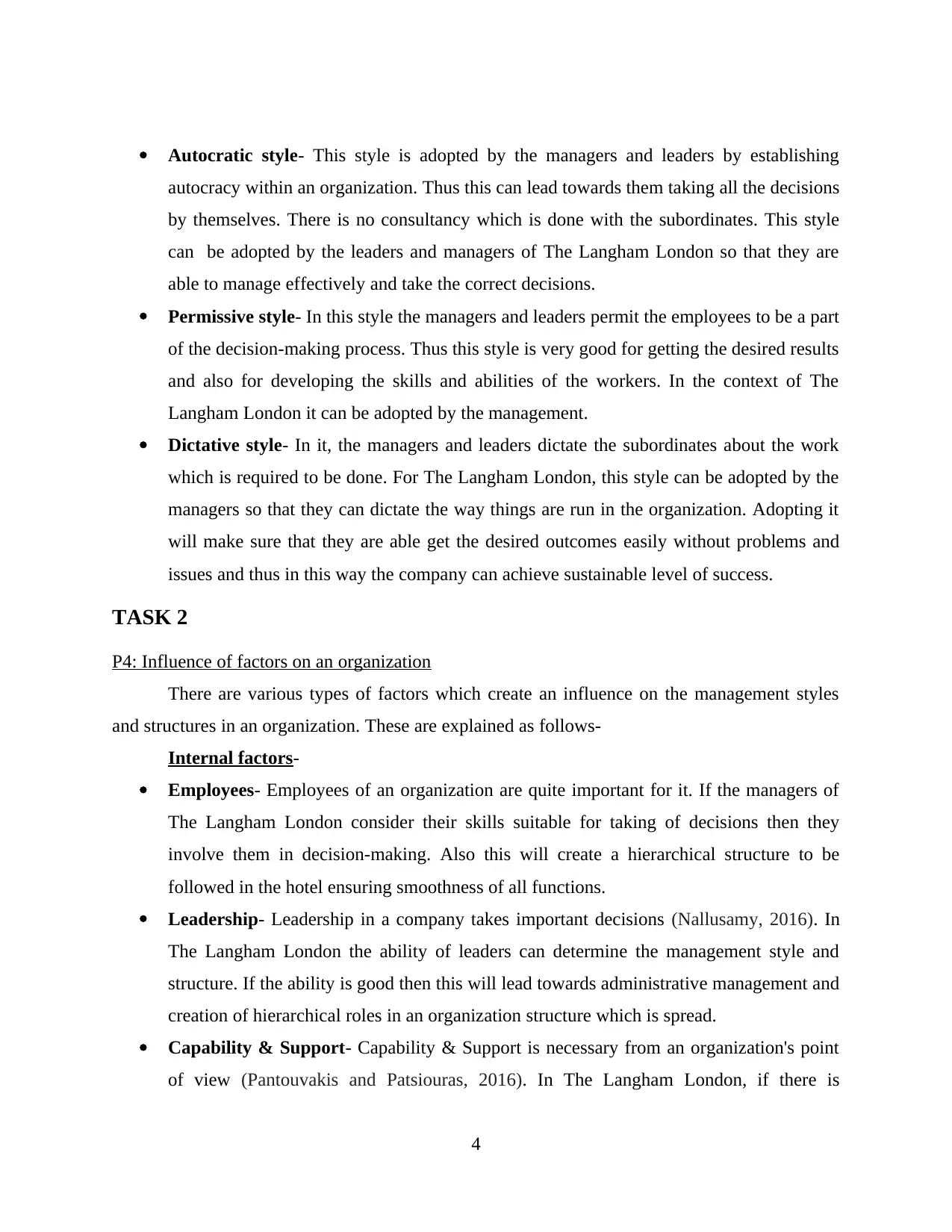
Autocratic style- This style is adopted by the managers and leaders by establishing
autocracy within an organization. Thus this can lead towards them taking all the decisions
by themselves. There is no consultancy which is done with the subordinates. This style
can be adopted by the leaders and managers of The Langham London so that they are
able to manage effectively and take the correct decisions.
Permissive style- In this style the managers and leaders permit the employees to be a part
of the decision-making process. Thus this style is very good for getting the desired results
and also for developing the skills and abilities of the workers. In the context of The
Langham London it can be adopted by the management.
Dictative style- In it, the managers and leaders dictate the subordinates about the work
which is required to be done. For The Langham London, this style can be adopted by the
managers so that they can dictate the way things are run in the organization. Adopting it
will make sure that they are able get the desired outcomes easily without problems and
issues and thus in this way the company can achieve sustainable level of success.
TASK 2
P4: Influence of factors on an organization
There are various types of factors which create an influence on the management styles
and structures in an organization. These are explained as follows-
Internal factors-
Employees- Employees of an organization are quite important for it. If the managers of
The Langham London consider their skills suitable for taking of decisions then they
involve them in decision-making. Also this will create a hierarchical structure to be
followed in the hotel ensuring smoothness of all functions.
Leadership- Leadership in a company takes important decisions (Nallusamy, 2016). In
The Langham London the ability of leaders can determine the management style and
structure. If the ability is good then this will lead towards administrative management and
creation of hierarchical roles in an organization structure which is spread.
Capability & Support- Capability & Support is necessary from an organization's point
of view (Pantouvakis and Patsiouras, 2016). In The Langham London, if there is
4
autocracy within an organization. Thus this can lead towards them taking all the decisions
by themselves. There is no consultancy which is done with the subordinates. This style
can be adopted by the leaders and managers of The Langham London so that they are
able to manage effectively and take the correct decisions.
Permissive style- In this style the managers and leaders permit the employees to be a part
of the decision-making process. Thus this style is very good for getting the desired results
and also for developing the skills and abilities of the workers. In the context of The
Langham London it can be adopted by the management.
Dictative style- In it, the managers and leaders dictate the subordinates about the work
which is required to be done. For The Langham London, this style can be adopted by the
managers so that they can dictate the way things are run in the organization. Adopting it
will make sure that they are able get the desired outcomes easily without problems and
issues and thus in this way the company can achieve sustainable level of success.
TASK 2
P4: Influence of factors on an organization
There are various types of factors which create an influence on the management styles
and structures in an organization. These are explained as follows-
Internal factors-
Employees- Employees of an organization are quite important for it. If the managers of
The Langham London consider their skills suitable for taking of decisions then they
involve them in decision-making. Also this will create a hierarchical structure to be
followed in the hotel ensuring smoothness of all functions.
Leadership- Leadership in a company takes important decisions (Nallusamy, 2016). In
The Langham London the ability of leaders can determine the management style and
structure. If the ability is good then this will lead towards administrative management and
creation of hierarchical roles in an organization structure which is spread.
Capability & Support- Capability & Support is necessary from an organization's point
of view (Pantouvakis and Patsiouras, 2016). In The Langham London, if there is
4
⊘ This is a preview!⊘
Do you want full access?
Subscribe today to unlock all pages.

Trusted by 1+ million students worldwide
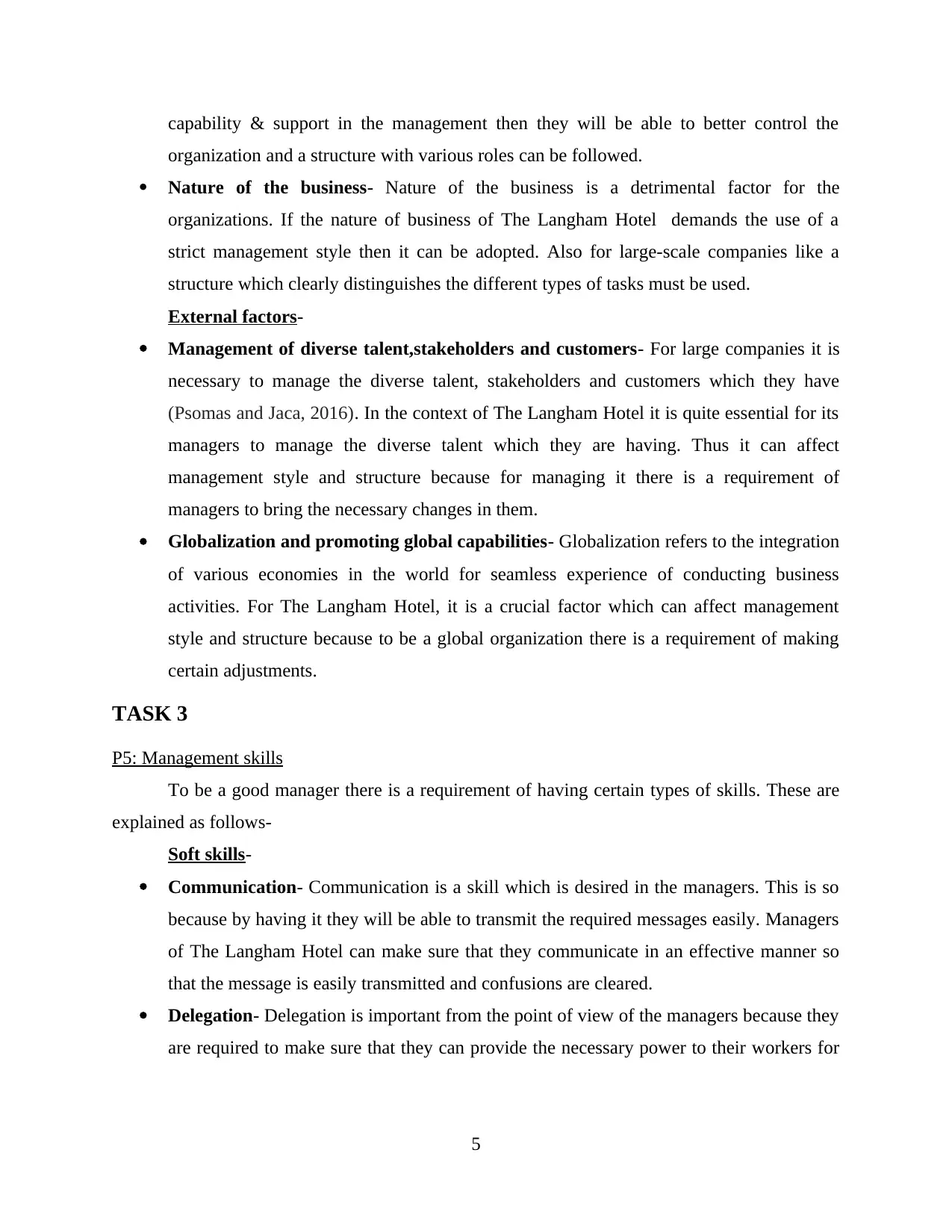
capability & support in the management then they will be able to better control the
organization and a structure with various roles can be followed.
Nature of the business- Nature of the business is a detrimental factor for the
organizations. If the nature of business of The Langham Hotel demands the use of a
strict management style then it can be adopted. Also for large-scale companies like a
structure which clearly distinguishes the different types of tasks must be used.
External factors-
Management of diverse talent,stakeholders and customers- For large companies it is
necessary to manage the diverse talent, stakeholders and customers which they have
(Psomas and Jaca, 2016). In the context of The Langham Hotel it is quite essential for its
managers to manage the diverse talent which they are having. Thus it can affect
management style and structure because for managing it there is a requirement of
managers to bring the necessary changes in them.
Globalization and promoting global capabilities- Globalization refers to the integration
of various economies in the world for seamless experience of conducting business
activities. For The Langham Hotel, it is a crucial factor which can affect management
style and structure because to be a global organization there is a requirement of making
certain adjustments.
TASK 3
P5: Management skills
To be a good manager there is a requirement of having certain types of skills. These are
explained as follows-
Soft skills-
Communication- Communication is a skill which is desired in the managers. This is so
because by having it they will be able to transmit the required messages easily. Managers
of The Langham Hotel can make sure that they communicate in an effective manner so
that the message is easily transmitted and confusions are cleared.
Delegation- Delegation is important from the point of view of the managers because they
are required to make sure that they can provide the necessary power to their workers for
5
organization and a structure with various roles can be followed.
Nature of the business- Nature of the business is a detrimental factor for the
organizations. If the nature of business of The Langham Hotel demands the use of a
strict management style then it can be adopted. Also for large-scale companies like a
structure which clearly distinguishes the different types of tasks must be used.
External factors-
Management of diverse talent,stakeholders and customers- For large companies it is
necessary to manage the diverse talent, stakeholders and customers which they have
(Psomas and Jaca, 2016). In the context of The Langham Hotel it is quite essential for its
managers to manage the diverse talent which they are having. Thus it can affect
management style and structure because for managing it there is a requirement of
managers to bring the necessary changes in them.
Globalization and promoting global capabilities- Globalization refers to the integration
of various economies in the world for seamless experience of conducting business
activities. For The Langham Hotel, it is a crucial factor which can affect management
style and structure because to be a global organization there is a requirement of making
certain adjustments.
TASK 3
P5: Management skills
To be a good manager there is a requirement of having certain types of skills. These are
explained as follows-
Soft skills-
Communication- Communication is a skill which is desired in the managers. This is so
because by having it they will be able to transmit the required messages easily. Managers
of The Langham Hotel can make sure that they communicate in an effective manner so
that the message is easily transmitted and confusions are cleared.
Delegation- Delegation is important from the point of view of the managers because they
are required to make sure that they can provide the necessary power to their workers for
5
Paraphrase This Document
Need a fresh take? Get an instant paraphrase of this document with our AI Paraphraser
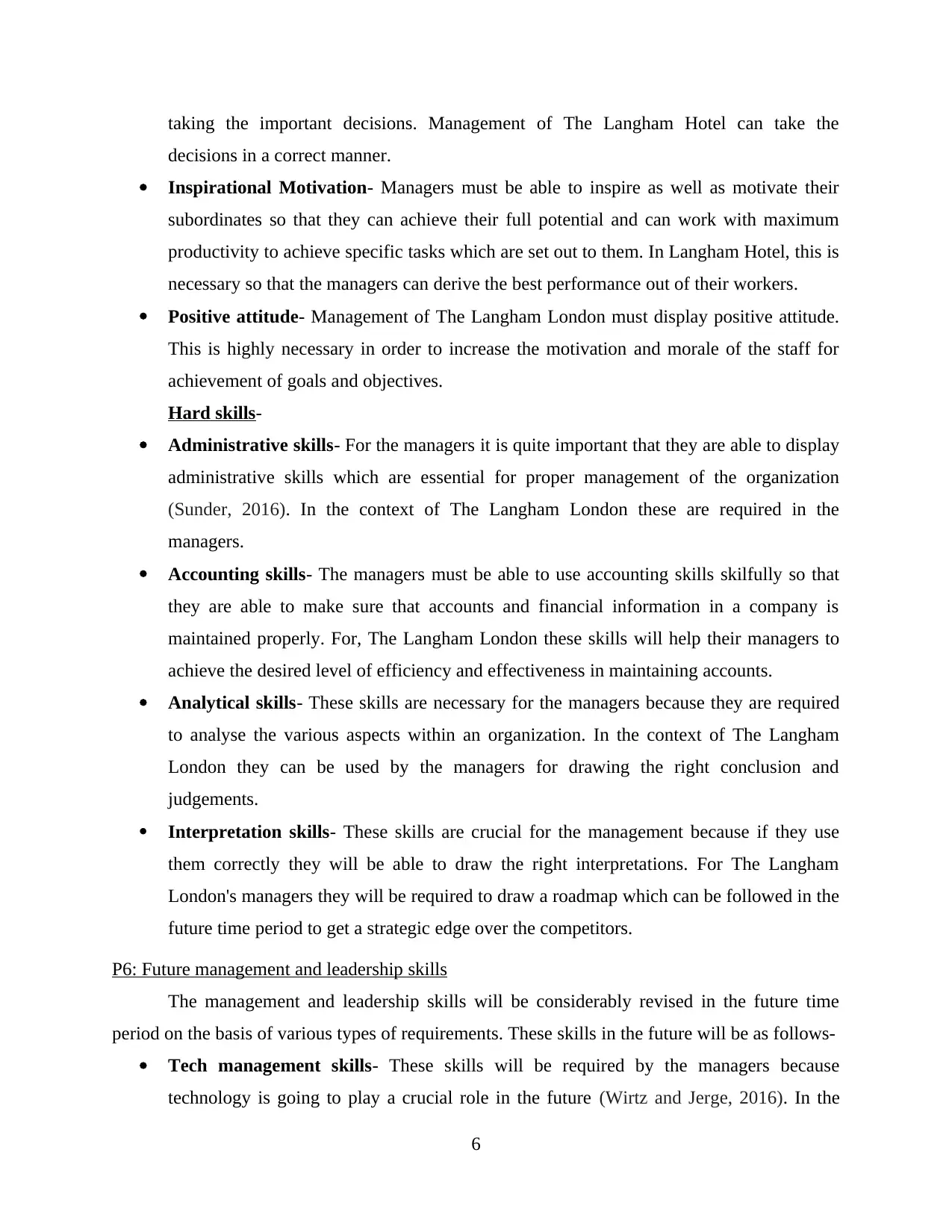
taking the important decisions. Management of The Langham Hotel can take the
decisions in a correct manner.
Inspirational Motivation- Managers must be able to inspire as well as motivate their
subordinates so that they can achieve their full potential and can work with maximum
productivity to achieve specific tasks which are set out to them. In Langham Hotel, this is
necessary so that the managers can derive the best performance out of their workers.
Positive attitude- Management of The Langham London must display positive attitude.
This is highly necessary in order to increase the motivation and morale of the staff for
achievement of goals and objectives.
Hard skills-
Administrative skills- For the managers it is quite important that they are able to display
administrative skills which are essential for proper management of the organization
(Sunder, 2016). In the context of The Langham London these are required in the
managers.
Accounting skills- The managers must be able to use accounting skills skilfully so that
they are able to make sure that accounts and financial information in a company is
maintained properly. For, The Langham London these skills will help their managers to
achieve the desired level of efficiency and effectiveness in maintaining accounts.
Analytical skills- These skills are necessary for the managers because they are required
to analyse the various aspects within an organization. In the context of The Langham
London they can be used by the managers for drawing the right conclusion and
judgements.
Interpretation skills- These skills are crucial for the management because if they use
them correctly they will be able to draw the right interpretations. For The Langham
London's managers they will be required to draw a roadmap which can be followed in the
future time period to get a strategic edge over the competitors.
P6: Future management and leadership skills
The management and leadership skills will be considerably revised in the future time
period on the basis of various types of requirements. These skills in the future will be as follows-
Tech management skills- These skills will be required by the managers because
technology is going to play a crucial role in the future (Wirtz and Jerge, 2016). In the
6
decisions in a correct manner.
Inspirational Motivation- Managers must be able to inspire as well as motivate their
subordinates so that they can achieve their full potential and can work with maximum
productivity to achieve specific tasks which are set out to them. In Langham Hotel, this is
necessary so that the managers can derive the best performance out of their workers.
Positive attitude- Management of The Langham London must display positive attitude.
This is highly necessary in order to increase the motivation and morale of the staff for
achievement of goals and objectives.
Hard skills-
Administrative skills- For the managers it is quite important that they are able to display
administrative skills which are essential for proper management of the organization
(Sunder, 2016). In the context of The Langham London these are required in the
managers.
Accounting skills- The managers must be able to use accounting skills skilfully so that
they are able to make sure that accounts and financial information in a company is
maintained properly. For, The Langham London these skills will help their managers to
achieve the desired level of efficiency and effectiveness in maintaining accounts.
Analytical skills- These skills are necessary for the managers because they are required
to analyse the various aspects within an organization. In the context of The Langham
London they can be used by the managers for drawing the right conclusion and
judgements.
Interpretation skills- These skills are crucial for the management because if they use
them correctly they will be able to draw the right interpretations. For The Langham
London's managers they will be required to draw a roadmap which can be followed in the
future time period to get a strategic edge over the competitors.
P6: Future management and leadership skills
The management and leadership skills will be considerably revised in the future time
period on the basis of various types of requirements. These skills in the future will be as follows-
Tech management skills- These skills will be required by the managers because
technology is going to play a crucial role in the future (Wirtz and Jerge, 2016). In the
6
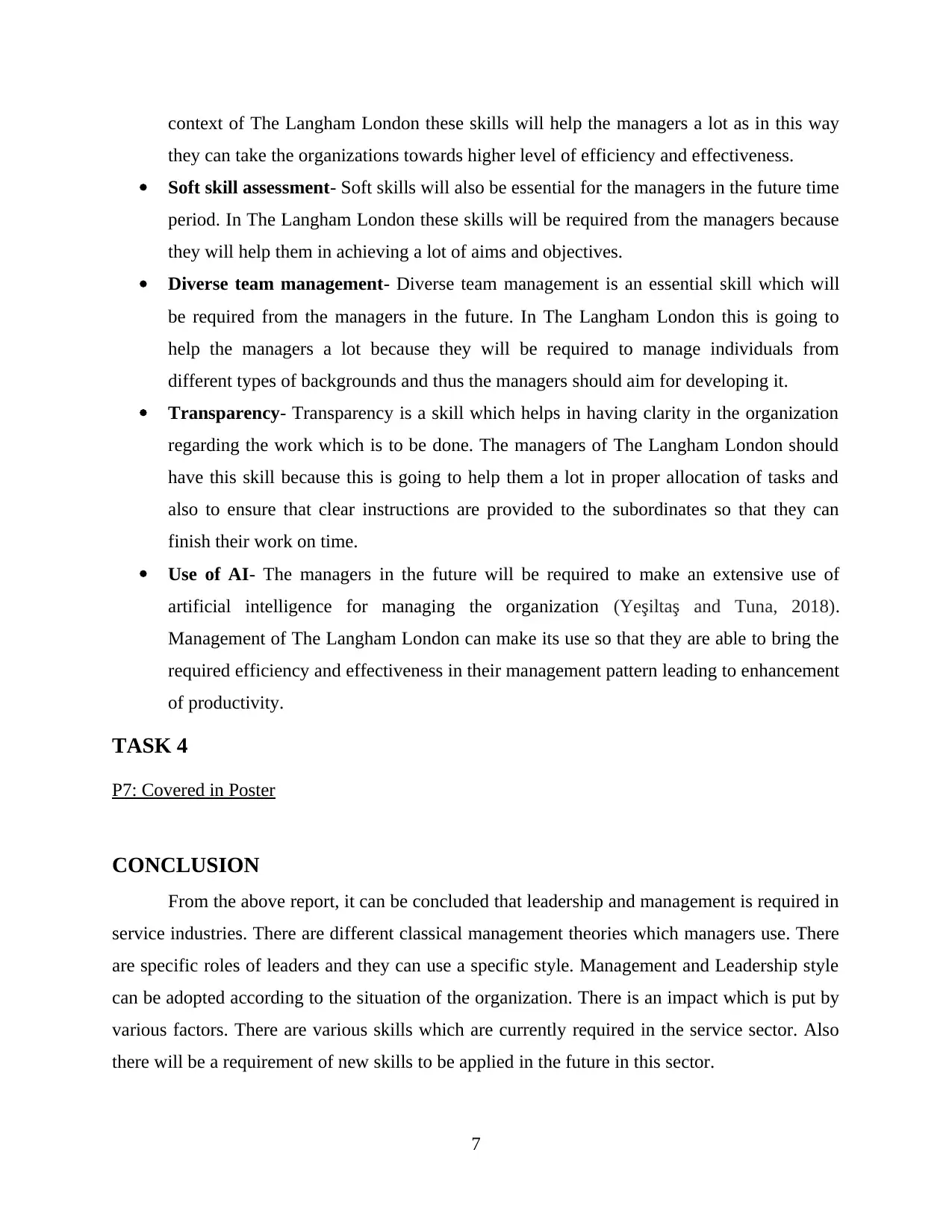
context of The Langham London these skills will help the managers a lot as in this way
they can take the organizations towards higher level of efficiency and effectiveness.
Soft skill assessment- Soft skills will also be essential for the managers in the future time
period. In The Langham London these skills will be required from the managers because
they will help them in achieving a lot of aims and objectives.
Diverse team management- Diverse team management is an essential skill which will
be required from the managers in the future. In The Langham London this is going to
help the managers a lot because they will be required to manage individuals from
different types of backgrounds and thus the managers should aim for developing it.
Transparency- Transparency is a skill which helps in having clarity in the organization
regarding the work which is to be done. The managers of The Langham London should
have this skill because this is going to help them a lot in proper allocation of tasks and
also to ensure that clear instructions are provided to the subordinates so that they can
finish their work on time.
Use of AI- The managers in the future will be required to make an extensive use of
artificial intelligence for managing the organization (Yeşiltaş and Tuna, 2018).
Management of The Langham London can make its use so that they are able to bring the
required efficiency and effectiveness in their management pattern leading to enhancement
of productivity.
TASK 4
P7: Covered in Poster
CONCLUSION
From the above report, it can be concluded that leadership and management is required in
service industries. There are different classical management theories which managers use. There
are specific roles of leaders and they can use a specific style. Management and Leadership style
can be adopted according to the situation of the organization. There is an impact which is put by
various factors. There are various skills which are currently required in the service sector. Also
there will be a requirement of new skills to be applied in the future in this sector.
7
they can take the organizations towards higher level of efficiency and effectiveness.
Soft skill assessment- Soft skills will also be essential for the managers in the future time
period. In The Langham London these skills will be required from the managers because
they will help them in achieving a lot of aims and objectives.
Diverse team management- Diverse team management is an essential skill which will
be required from the managers in the future. In The Langham London this is going to
help the managers a lot because they will be required to manage individuals from
different types of backgrounds and thus the managers should aim for developing it.
Transparency- Transparency is a skill which helps in having clarity in the organization
regarding the work which is to be done. The managers of The Langham London should
have this skill because this is going to help them a lot in proper allocation of tasks and
also to ensure that clear instructions are provided to the subordinates so that they can
finish their work on time.
Use of AI- The managers in the future will be required to make an extensive use of
artificial intelligence for managing the organization (Yeşiltaş and Tuna, 2018).
Management of The Langham London can make its use so that they are able to bring the
required efficiency and effectiveness in their management pattern leading to enhancement
of productivity.
TASK 4
P7: Covered in Poster
CONCLUSION
From the above report, it can be concluded that leadership and management is required in
service industries. There are different classical management theories which managers use. There
are specific roles of leaders and they can use a specific style. Management and Leadership style
can be adopted according to the situation of the organization. There is an impact which is put by
various factors. There are various skills which are currently required in the service sector. Also
there will be a requirement of new skills to be applied in the future in this sector.
7
⊘ This is a preview!⊘
Do you want full access?
Subscribe today to unlock all pages.

Trusted by 1+ million students worldwide
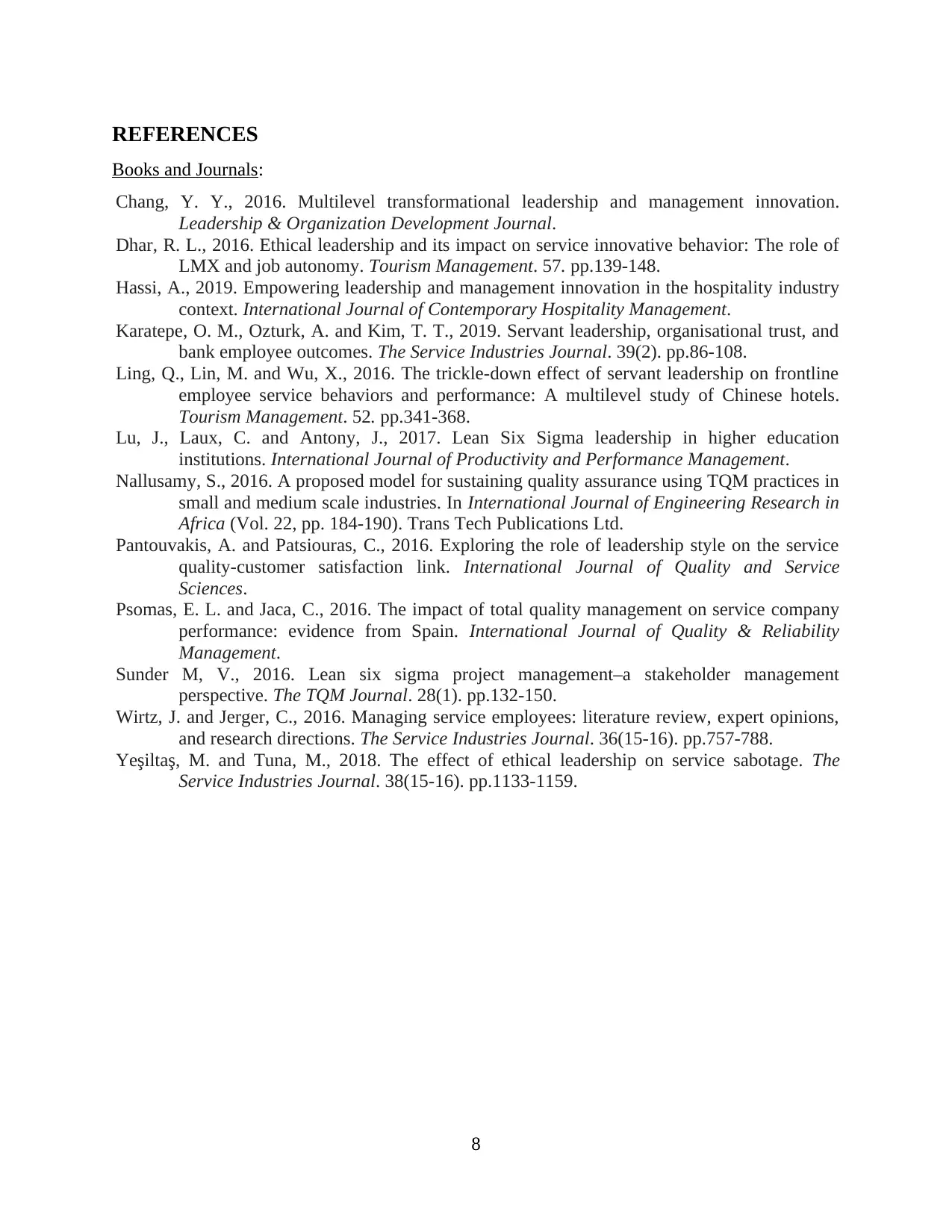
REFERENCES
Books and Journals:
Chang, Y. Y., 2016. Multilevel transformational leadership and management innovation.
Leadership & Organization Development Journal.
Dhar, R. L., 2016. Ethical leadership and its impact on service innovative behavior: The role of
LMX and job autonomy. Tourism Management. 57. pp.139-148.
Hassi, A., 2019. Empowering leadership and management innovation in the hospitality industry
context. International Journal of Contemporary Hospitality Management.
Karatepe, O. M., Ozturk, A. and Kim, T. T., 2019. Servant leadership, organisational trust, and
bank employee outcomes. The Service Industries Journal. 39(2). pp.86-108.
Ling, Q., Lin, M. and Wu, X., 2016. The trickle-down effect of servant leadership on frontline
employee service behaviors and performance: A multilevel study of Chinese hotels.
Tourism Management. 52. pp.341-368.
Lu, J., Laux, C. and Antony, J., 2017. Lean Six Sigma leadership in higher education
institutions. International Journal of Productivity and Performance Management.
Nallusamy, S., 2016. A proposed model for sustaining quality assurance using TQM practices in
small and medium scale industries. In International Journal of Engineering Research in
Africa (Vol. 22, pp. 184-190). Trans Tech Publications Ltd.
Pantouvakis, A. and Patsiouras, C., 2016. Exploring the role of leadership style on the service
quality-customer satisfaction link. International Journal of Quality and Service
Sciences.
Psomas, E. L. and Jaca, C., 2016. The impact of total quality management on service company
performance: evidence from Spain. International Journal of Quality & Reliability
Management.
Sunder M, V., 2016. Lean six sigma project management–a stakeholder management
perspective. The TQM Journal. 28(1). pp.132-150.
Wirtz, J. and Jerger, C., 2016. Managing service employees: literature review, expert opinions,
and research directions. The Service Industries Journal. 36(15-16). pp.757-788.
Yeşiltaş, M. and Tuna, M., 2018. The effect of ethical leadership on service sabotage. The
Service Industries Journal. 38(15-16). pp.1133-1159.
8
Books and Journals:
Chang, Y. Y., 2016. Multilevel transformational leadership and management innovation.
Leadership & Organization Development Journal.
Dhar, R. L., 2016. Ethical leadership and its impact on service innovative behavior: The role of
LMX and job autonomy. Tourism Management. 57. pp.139-148.
Hassi, A., 2019. Empowering leadership and management innovation in the hospitality industry
context. International Journal of Contemporary Hospitality Management.
Karatepe, O. M., Ozturk, A. and Kim, T. T., 2019. Servant leadership, organisational trust, and
bank employee outcomes. The Service Industries Journal. 39(2). pp.86-108.
Ling, Q., Lin, M. and Wu, X., 2016. The trickle-down effect of servant leadership on frontline
employee service behaviors and performance: A multilevel study of Chinese hotels.
Tourism Management. 52. pp.341-368.
Lu, J., Laux, C. and Antony, J., 2017. Lean Six Sigma leadership in higher education
institutions. International Journal of Productivity and Performance Management.
Nallusamy, S., 2016. A proposed model for sustaining quality assurance using TQM practices in
small and medium scale industries. In International Journal of Engineering Research in
Africa (Vol. 22, pp. 184-190). Trans Tech Publications Ltd.
Pantouvakis, A. and Patsiouras, C., 2016. Exploring the role of leadership style on the service
quality-customer satisfaction link. International Journal of Quality and Service
Sciences.
Psomas, E. L. and Jaca, C., 2016. The impact of total quality management on service company
performance: evidence from Spain. International Journal of Quality & Reliability
Management.
Sunder M, V., 2016. Lean six sigma project management–a stakeholder management
perspective. The TQM Journal. 28(1). pp.132-150.
Wirtz, J. and Jerger, C., 2016. Managing service employees: literature review, expert opinions,
and research directions. The Service Industries Journal. 36(15-16). pp.757-788.
Yeşiltaş, M. and Tuna, M., 2018. The effect of ethical leadership on service sabotage. The
Service Industries Journal. 38(15-16). pp.1133-1159.
8
1 out of 10
Related Documents
Your All-in-One AI-Powered Toolkit for Academic Success.
+13062052269
info@desklib.com
Available 24*7 on WhatsApp / Email
![[object Object]](/_next/static/media/star-bottom.7253800d.svg)
Unlock your academic potential
Copyright © 2020–2026 A2Z Services. All Rights Reserved. Developed and managed by ZUCOL.





